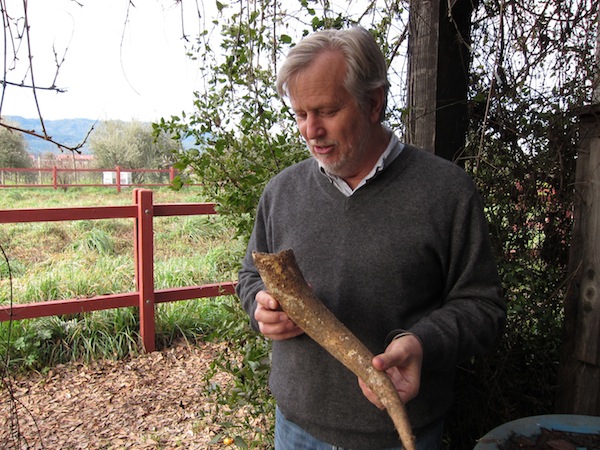Marc Kreydenweiss Perrières and Kalbi Jjim braised short ribs
Marc, Manfred and Antoine Kreydenweiss
For the price (around $15), you would be hard pressed to find a red wine from anywhere in the world with as much dense yet perfectly rounded, juicy fruit, and fresh, earthy qualities, as the 2006 Marc Kreydenweiss Perrières, Costières de Nîmes. The beauty of all this is that this smooth yet gutsy red is made by a winemaker who, for most of the past twenty years, was universally acclaimed for the quality of his white wines, made from grapes like Riesling and Pinot Gris.
The first turning point for Marc Kreydenweiss began in 1989, when he committed to transforming all of his estate owned vineyards in Alsace, France to principles of biodynamic viticulture; which he did with the clear purpose of breathing renewed life into his soils, and magnifying grape flavor and vineyard expression. Simply put, naturally healthy soils produce not just healthy grapes, but also more intense, naturalistic wines more likely to express terroir, or “sense of place.”
The biodynamically farmed Kreydenweiss vineyard in Costières de Nîmes
The second turning point was in 1999, when Kreydenweiss ventured outside of his native Alsace (where he is a twelfth generation grower) to purchase a vineyard in the Costières de Nîmes AOC, just south of the Rhône Valley, for the express purpose of producing something he couldn’t effectively do in Alsace: a deep colored red wine; grown, of course, biodynamically.
At the time when Kreydenweiss purchased his red wine property – called Perrières (the French word for fist sized “stones,” which dominate Perrières’ terrain) – Costières de Nîmes was still part of the vast Languedoc appellation. But because local growers strongly felt that the vineyards near the village of Nîmes bore a closer resemblance to vineyards of the Rhône rather than the rest of the Languedoc, they successfully petitioned the INAO to have Costères de Nîmes reclassified within Vallée du Rhône in 2004.
And indeed, Kreydenweiss’s ’06 Perrières – vinified from Carignan (60%), Syrah (20%) and Grenache (20%) – is not just bursting with the sweet, plump, raisined berry and bing cherry qualities common to Southern French grapes, but is also tinged with the type of wild, scrubby, resiny, woodsy garrigue, and charred meat aromas and flavors, often associated with classic reds of the Southern Rhône (such as Gigondas and Vacqueyras).
Do biodynamics have a lot to do with this balance of pure fruit and goût de terroir (i.e. “taste of the earth”)? If you ask Marc’s winemaker/son, Antoine Kreydenweiss, the relationship is direct, as he has been quoted to say, “By drinking a bottle of our wine, you can touch our soils, and also touch our family.” And for the Kreydenweiss family, biodynamics is a living exchange between soil, vines, and custodian.
Kalbi Jjim. Saveur.
The easy food match for a wine like the Kreydenweiss Perrières is grilled beef tenderloins or brisket with rock salt and cracked pepper, maybe brushed with olive oil, or a dry rub of not much more than powdered garlic, onion, paprika, plus salt-N-pepa. And you can’t go wrong with that.
But if you’re ready for an adventurous match that highlights the fragrant, earthy, sticky textured fruitiness of the Perrières, try this recipe for Kalbi Jjim, Korean style braised short ribs of beef (you can usually source the right cuts in Asian supermarkets), slow cooked in wine, juice and spices until the meat falls off the bone and the marrow reduces the broth into a thick, gelatinous sauce. Savory... sweet!






Comments
Post a Comment